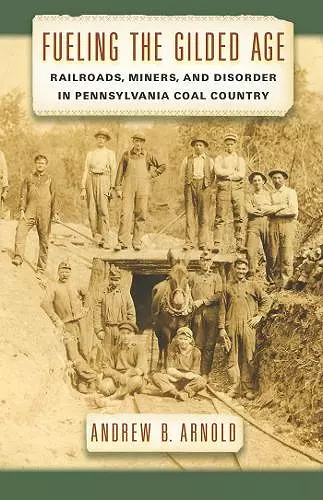Fueling the Gilded Age
Railroads, Miners, and Disorder in Pennsylvania Coal Country
Format:Hardback
Publisher:New York University Press
Published:11th Apr '14
Currently unavailable, and unfortunately no date known when it will be back

If the railroads won the Gilded Age, the coal industry lost it. Railroads epitomized modern management, high technology, and vast economies of scale. By comparison, the coal industry was embarrassingly primitive. Miners and operators dug coal, bought it, and sold it in 1900 in the same ways that they had for generations. In the popular imagination, coal miners epitomized anti-modern forces as the so-called “Molly Maguire” terrorists.
Yet the sleekly modern railroads were utterly dependent upon the disorderly coal industry. Railroad managers demanded that coal operators and miners accept the purely subordinate role implied by their status. They refused.
Fueling the Gilded Age shows how disorder in the coal industry disrupted the strategic plans of the railroads. It does so by expertly intertwining the history of two industries—railroads and coal mining—that historians have generally examined from separate vantage points. It shows the surprising connections between railroad management and miner organizing; railroad freight rate structure and coal mine operations; railroad strategy and strictly local legal precedents. It combines social, economic, and institutional approaches to explain the Gilded Age from the perspective of the relative losers of history rather than the winners. It beckons readers to examine the still-unresolved nature of America’s national conundrum: how to reconcile the competing demands of national corporations, local businesses, and employees.
Making extensive use of local newspapers and correspondence, Arnold includes the role of mine operators as well as railroads and places conflicts in the broader geographic and historical context. Fiercely independent coal miners sought ways to protect their interests through a series of strikes in the 1880s, advocated weighman associations, and eventually formed the United Mine Workers of America. Coal operators hoped to control miners and organized the Seaboard Coal Association to obtain coal market outlets, while the railroads worked to exercise control over the needed fuel source. The chapter on the United Mine Workers in the central Pennsylvania field is particularly well done. * Choice *
This book remains a detailed and thorough attempt to demonstrate the risks hat historians face by focusing too heavily on the & winners within a given period of history. * American Nineteenth Century History *
Fueling the Gilded Age does a fine job of integrating the fierce competition among the railroad barons with the long, uphill fight to establish the United Mine Workers. * Labor Notes *
In the end though perhaps it is more useful for us to concentrate on the disorder of the period, not some longed-for order. As Arnold so persuasively shows, disorder was the great constant of the ageand great legacy of the Gilded Age for the twentieth century. * Labor *
Arnold presents a deliberately complex portrait of developments. Hence, he finely depicts the complicated relations among mine owners, major railroad companies, and coal miners. * Journal of Interdisciplinary History *
Historians interested in Pennsylvania's coal industry usually focus on the anthracite region in the east or the bituminous fields in the west; the large mining industry of central Pennsylvania (centered around Clearfield) has now found its historian in Andrew Arnold. Examining workplace practices and the roles of women, unions, strikes, the church, violence, the courts, and politics from the early 1870s to the mid-1920s, Arnold paints a complicated picture in which workers, mine supervisors, local communities, the law, the state, and the railroads that frequently owned the mines interacted in complex ways. Based on deep research in previously unexplored local manuscripts and newspapers, Arnold's well-written study restores to historical memory an important industry of which few people even in the region itself are aware. -- William Pencak,Professor Emeritus of History and Jewish Studies, Penn State University
In this beautifully crafted new history of capitalism, Arnold shows us how rough and tumble community unionism worked in the years before unions came to the coalfields. We learn about strikes led by women, rough music, square turns, and miners freedoms and then how the Knights of Labor and United Mine Workers both emerged by relying on these long and deep coalfield traditions. Vital for anyone wanting to understand the relationship between international capitalism and workplace rights. -- Scott Nelson,Legum Professor of History, The College of William & Mary
ISBN: 9780814764985
Dimensions: unknown
Weight: 522g
287 pages